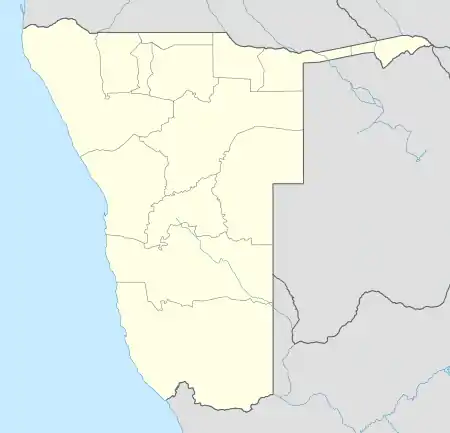Arandis | |
|---|---|
.jpg.webp) | |
 Arandis Location in Namibia | |
| Coordinates: 22°25′S 14°58′E / 22.417°S 14.967°E | |
| Country | |
| Region | Erongo Region |
| Constituency | Arandis Constituency |
| Established | 1978 |
| Government | |
| • Major | Risto Kapenda |
| Area | |
| • Total | 12.9 sq mi (33.4 km2) |
| • Land | 12.9 sq mi (33.4 km2) |
| Population (2011)[1] | |
| • Total | 5,214 |
| • Density | 400/sq mi (160/km2) |
| Time zone | UTC+2 (South African Standard Time) |
| Climate | BWh |
Arandis (Khoekhoe: the place where people cry)[2] is a mining town in the Erongo Region of western central Namibia. Originally a camp for workers of the nearby Rössing uranium mine, Arandis was declared a town in 1994.
History
Established for the workers of Rössing Uranium in 1978, Arandis was granted self–administration and town status in 1994.[3] Arandis owns 29 square kilometres (11 sq mi) of land and in 2010 had 7,600 inhabitants, most of whom are somehow connected to the mine.[4]
Economy and infrastructure
Arandis has been called the Uranium Capital of the World as it is located just 15 km outside the world's largest open-pit uranium mine, the Rössing uranium mine. It also serves the Husab and Trekkopje uranium mines. Economic conditions in town have thus always been dependent on the word market price of uranium.[5][6]
Uranium mining operations, in particular during the Rössing mine's early years, have led to allegations of occupational health violations and radiation-related illnesses. A 1993 report from a medical student was dismissed both by the mine and the authorities, further independent research has never been conducted.[5]
The 2000s saw a resurgence in economic growth in Arandis. With the global energy crisis, a significant rise in demand occurred for nuclear energy, increasing demand for Arandis' uranium. Banks, which had previously closed and youth who had previously left the town seeking employment elsewhere, returned.[7] In 2008, negotiations were at an advanced stage for a Chinese company, Namibia Industrial Mining Limited to build a factory for making building materials in Arandis.[8]
After an investment conference was held in 2011, investors have decided to erect a shopping mall in town. Construction of the mall started soon afterwards, the anticipated completion date is May 2013.[9]
Transportation
Arandis is situated on the B2 national road that connects the central Atlantic coast to Windhoek. The Arandis Railway Station is a crossing loop on the Trans-Namib Railway between Swakopmund and Usakos. Arandis Airport is also nearby.[10]
Education
In 1991, the Namibian Institute of Mining and Technology (NIMT), a technical institute focusing on training skilled industrial workers, was established.[6]
Kolin Foundation Secondary School and U.B. Dax Primary School are situated in town.
Politics
Arandis is governed by a town council that has seven seats.[11]
In the 2004 local authority elections SWAPO won the town council election with 753 votes and gained four seats. Two seats and 295 votes were obtained by the United Democratic Front (UDF), and one seat (139 votes) went to the Congress of Democrats (CoD).[12] SWAPO also won the 2010 local authority elections SWAPO. It received 664 votes. The (UDF) finished in second place with 243 votes, and the Rally for Democracy and Progress (RDP, an opposition party founded in 2007) received 72 votes.[13] In the 2015 local authority elections SWAPO won again, gaining 5 seats (780 votes). The remaining 2 seats went to the UDF (295 votes).[14]
SWAPO also won the 2020 local authority election but for the first time failed to gain the majority of seats in the town council. SWAPO obtained 551 votes and gained three seats. Runner-up Independent Patriots for Change (IPC, newly formed in August 2020) gained two seats (405 votes), and UDF and Landless People's Movement (LPM) gained one seat each with 230 and 140 votes, respectively.[15]
See also
External links
References
- ↑ "Table 4.2.2 Urban population by Census years (2001 and 2011)" (PDF). Namibia 2011 - Population and Housing Census Main Report. Namibia Statistics Agency. p. 39. Retrieved 24 August 2016.
- ↑ Cassidy, Joseph (2009). Place Names of Namibia A Historical Dictionary. Windhoek: Macmillan Education Namibia Publishers (Pty) Ltd. p. 1. ISBN 978-99916-0-654-5.
- ↑ Hartman, Adam (8 November 2011). "Investment confrence [sic] promotes Arandis". The Namibian. p. 1. Archived from the original on 6 June 2012.
- ↑ "ELECTIONS 2010: Erongo regional profile". New Era. 16 November 2010. Archived from the original on 6 September 2012. Retrieved 16 November 2010.
- 1 2 Schneider, Victoria (20 January 2014). "Arandis: The uranium capital of the world". Al Jazeera.
- 1 2 Hartman, Adam (May 2019). "Evolution of Namibia's mining towns". Mining Journal supplement to The Namibian. pp. 26–33.
- ↑ Timberg, Craig (6 December 2006). "Rising Interest in Nuclear Power Brings New Life to Uranium Mining". The Washington Post.
- ↑ "Chinese firm plans Arandis factory". The Namibian. NAMPA. 23 July 2008.
- ↑ de Klerk, Eveline (21 August 2012). "Arandis mall takes shape". New Era.
- ↑ "Arandis Airport". www.airports-worldwide.com. Archived from the original on 2012-10-30. Retrieved 13 May 2020.
- ↑ "Know Your Local Authority". Election Watch. No. 3. Institute for Public Policy Research. 2015. p. 4.
- ↑ "14 May 2004 Local Authority Elections in Namibia". African Elections Database. 31 December 2005. Retrieved 24 December 2023.
- ↑ Result of the 2010 Local Authority Elections for Arandis Electoral Commission of Namibia Archived March 16, 2012, at the Wayback Machine
- ↑ "Local elections results". Electoral Commission of Namibia. 28 November 2015. p. 1. Archived from the original on 10 December 2015. Retrieved 11 August 2017.
- ↑ "2020 Local Authority Elections Results and Allocation of Seats" (PDF). Electoral Commission of Namibia. 29 November 2020. p. 4. Archived from the original (PDF) on 24 January 2021. Retrieved 3 December 2020.